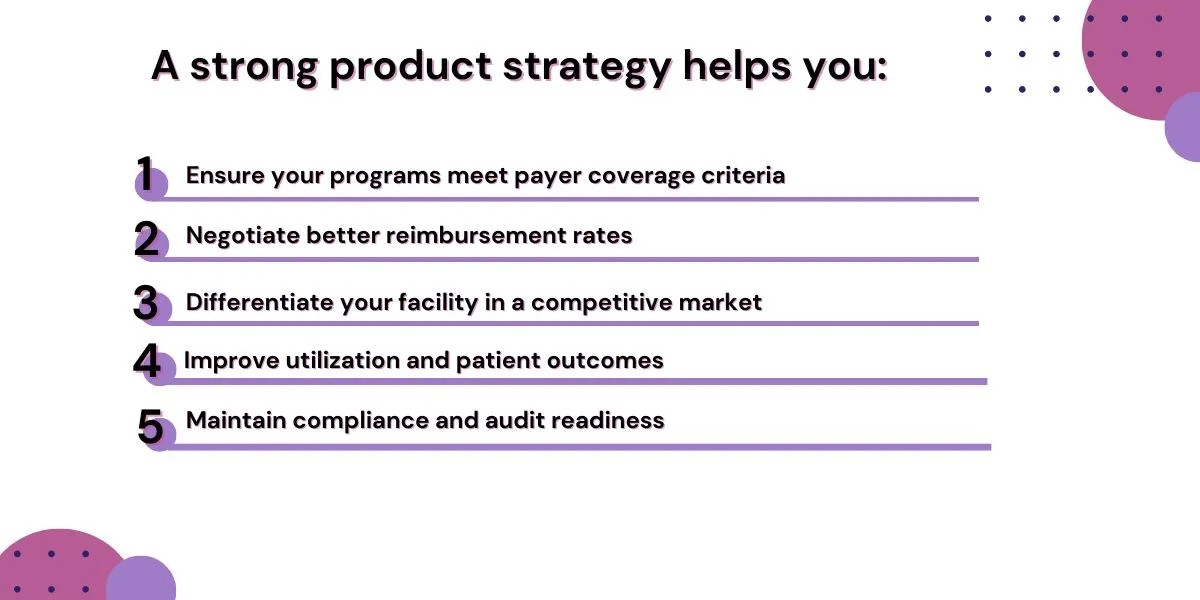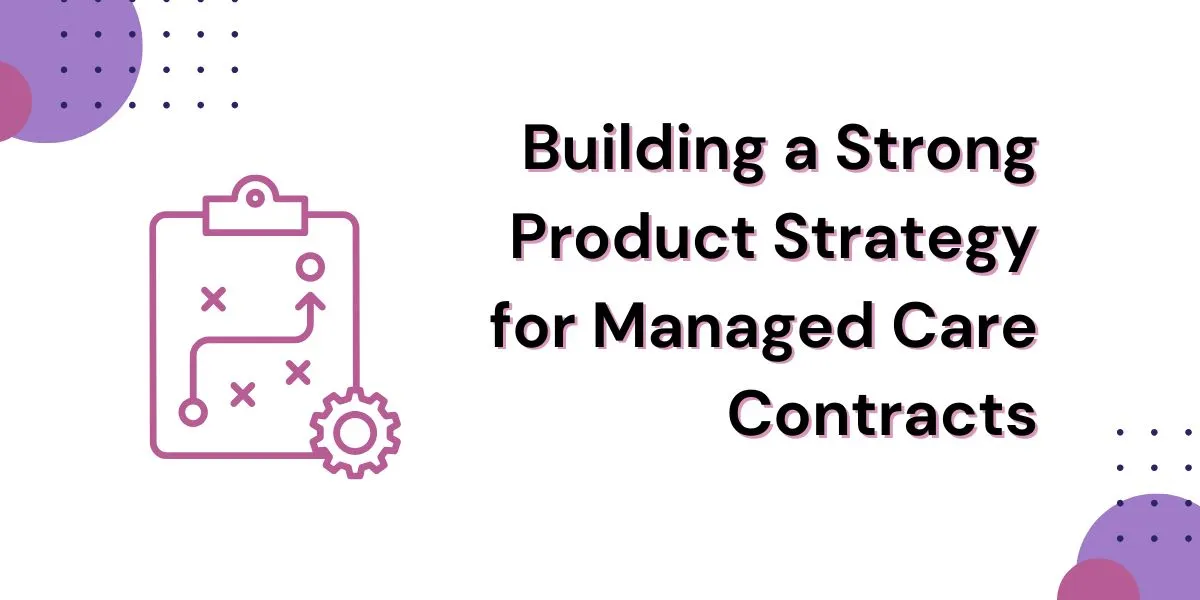Blog

In behavioral healthcare, product strategy isn’t just about what services you provide—it’s about how you position, price, and deliver them to align with payer expectations and patient needs. When it comes to managed care contracts, a well-defined product strategy can be the difference between sustainable revenue and constant reimbursement challenges.
At Hansei Solutions, we help treatment centers and healthcare providers optimize their financial operations by aligning product strategy with payer contract requirements—ensuring that services are both clinically sound and financially viable.
What Is Product Strategy in Managed Care?
In healthcare, product strategy refers to how an organization defines and structures its offerings to meet both patient needs and payer requirements. This includes everything from the design of treatment programs to how those services are billed, reimbursed, and positioned within managed care networks.
For behavioral health providers, this might involve developing specialized programs—like intensive outpatient programs (IOPs), dual diagnosis care, or telehealth options—that align with managed care guidelines and market demand.
A strong product strategy helps you:
- Ensure your programs meet payer coverage criteria
- Negotiate better reimbursement rates
- Differentiate your facility in a competitive market
- Improve utilization and patient outcomes
- Maintain compliance and audit readiness
When product strategy and contract management work together, providers can deliver value-based care that benefits both patients and payers.

Why Product Strategy Matters in Managed Care Contracts
Managed care contracts determine how providers are reimbursed for the services they deliver. Without a defined product strategy, treatment centers often face issues like underpayment, denials, or limited network participation.
Here’s why strategy matters:
1. It Defines Your Service Value
A clear product strategy helps communicate the clinical and financial value of your services to payers. For example, a program that demonstrates measurable outcomes—like reduced relapse rates or improved patient retention—can strengthen your negotiating position in contract discussions.
2. It Shapes Reimbursement Opportunities
Product strategy affects your rate structure and billing codes. Ensuring that your programs are CPT- and ICD-compliant helps maximize reimbursement potential while avoiding costly denials.
3. It Aligns Clinical and Financial Goals
Strong product strategies bridge the gap between patient care and profitability. When your clinical offerings align with payer expectations, you reduce friction in billing and improve cash flow predictability.
4. It Supports Value-Based Care Models
As payers increasingly shift toward outcome-based reimbursement, providers must show data-driven results. A solid product strategy helps you integrate clinical outcomes tracking into contract negotiations—positioning your facility as a high-value partner.

Building a Strong Product Strategy for Managed Care Contracts
Creating a strong product strategy requires collaboration across clinical, financial, and administrative teams. Hansei Solutions works closely with providers to assess existing service lines, identify opportunities for differentiation, and develop strategies that enhance payer relationships and revenue integrity.
Key elements of a strong product strategy include:
- Market and Payer Analysis – Understanding local market needs and payer trends allows providers to tailor services that meet both patient demand and contract opportunities.
- Service Line Optimization – Analyzing which programs generate the highest clinical outcomes and financial returns helps ensure sustainable growth. This might include developing new tracks (such as trauma-focused or adolescent programs) that fill market gaps.
- Documentation and Coding Alignment – Accurate documentation and coding are critical for ensuring your product strategy translates into proper reimbursement. Hansei Solutions assists providers in aligning CPT and revenue codes with managed care guidelines to reduce denials.
- Outcome Measurement and Reporting – Data-driven care models are the foundation of modern managed care. Implementing tools to measure and report outcomes strengthens payer trust and improves future contract negotiations.
- Contract Negotiation Support – A clear product strategy gives you leverage in contract discussions. When you can demonstrate quality outcomes and efficient care delivery, payers are more likely to approve favorable terms and higher reimbursement rates.
The Connection Between Product Strategy and Revenue Cycle Performance
A well-executed product strategy improves every stage of the revenue cycle. It helps your billing team understand the full scope of covered services, supports accurate claim submissions, and minimizes denials.
When product strategy is integrated into managed care planning, you gain:
- Predictable reimbursement patterns
- Reduced administrative burden
- Improved cash flow consistency
- Better payer relationships
At Hansei Solutions, we integrate financial intelligence into clinical operations—helping providers transform their approach from reactive to proactive.
FAQs About Product Strategy in Managed Care Contracts
What does “product strategy” mean for behavioral health centers?
It’s the blueprint for how your programs are developed, priced, and delivered to align with payer expectations and market needs.
How can product strategy improve contract negotiations?
By clearly defining the clinical and financial value of your services, you can negotiate stronger reimbursement terms and minimize underpayment risks.
What happens if a provider doesn’t have a defined product strategy?
Lack of strategy often leads to inconsistent billing, coverage disputes, and missed reimbursement opportunities with managed care payers.
How does Hansei Solutions support providers in developing product strategy?
We help providers analyze payer data, refine service lines, and design programs that meet both clinical outcomes and payer performance metrics.
Is product strategy only relevant for large organizations?
No. Even smaller treatment centers benefit from product strategy—especially when entering new markets, expanding service lines, or joining managed care networks.
Partner with Hansei Solutions to Strengthen Your Product Strategy
In a managed care environment, strategy and sustainability go hand in hand. At Hansei Solutions, we partner with behavioral health providers to build product strategies that align with payer expectations, optimize revenue, and support long-term growth.
Our experienced team bridges the gap between clinical excellence and financial performance—so you can focus on delivering exceptional patient care.
Ready to align your managed care contracts with your strategic vision? Contact Hansei Solutions today to learn how we can help refine your product strategy and maximize contract performance.

Ready to focus on providing healthcare? Let us lighten your load.
We’re here to address your pain points and create growth opportunities for your organization. We’re passionate about what we do, and it shows in every interaction. Learn what makes us tick and schedule a demo today.